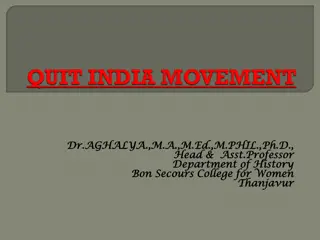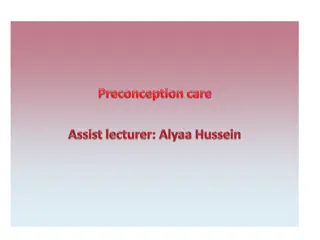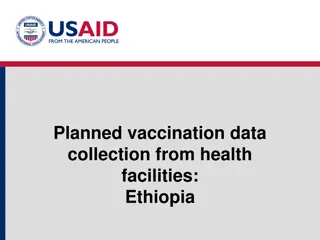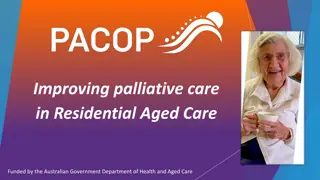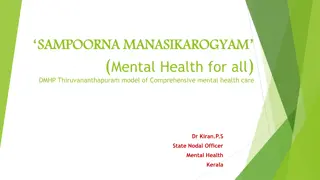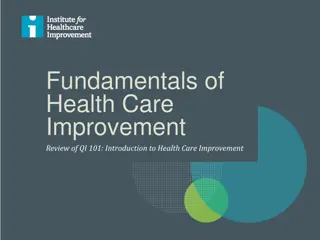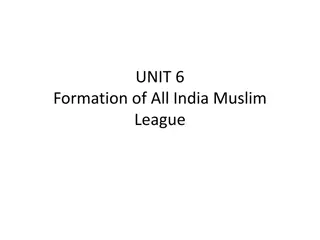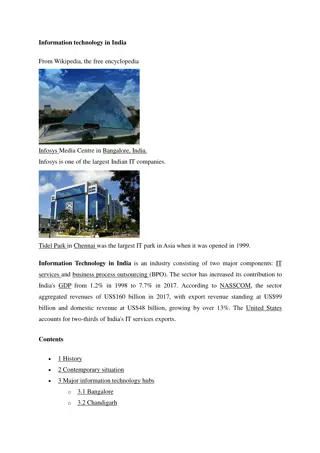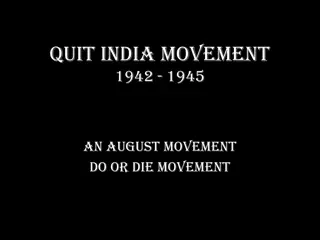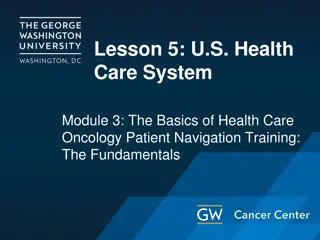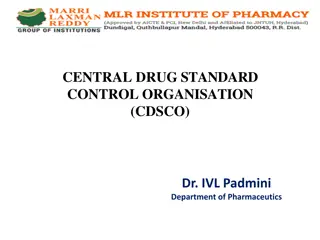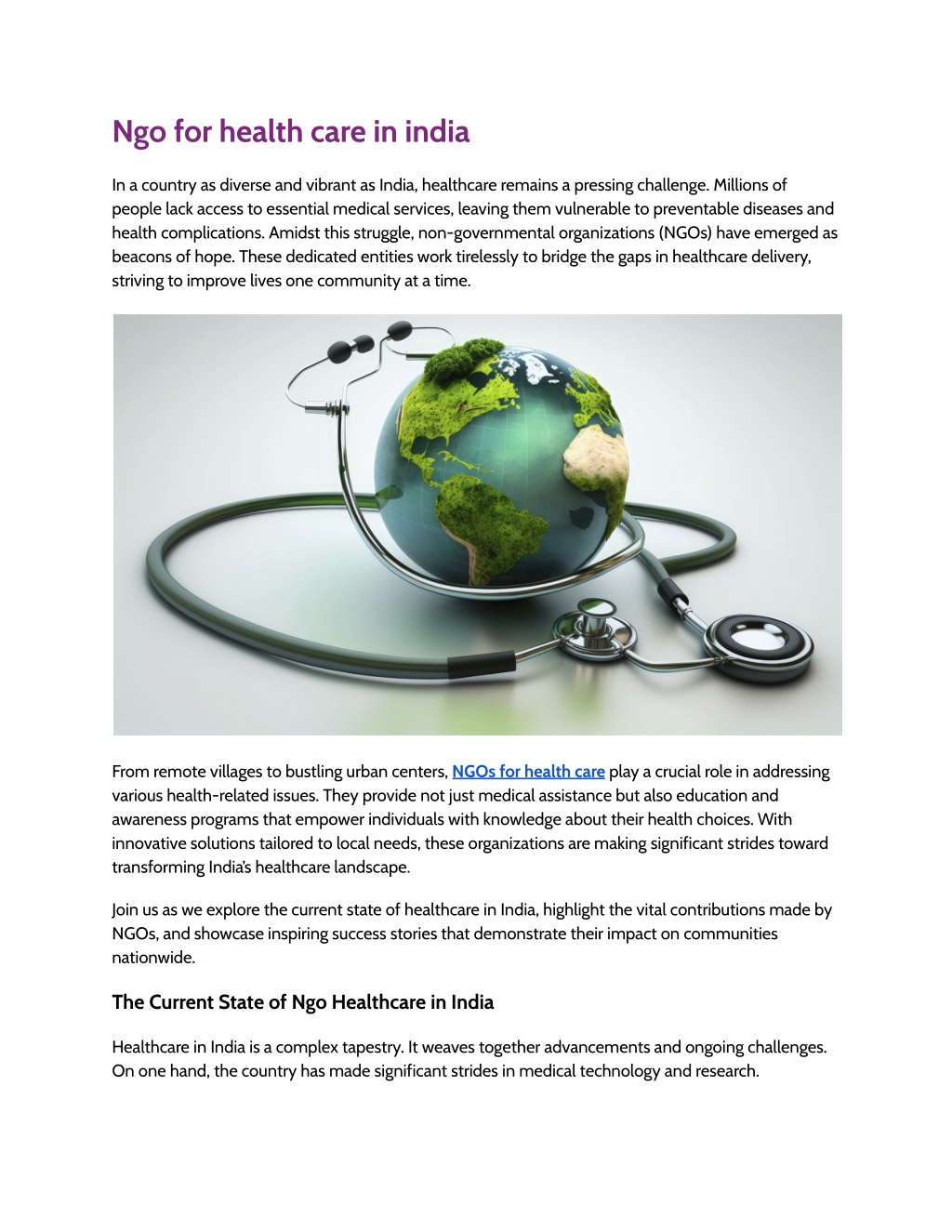
Ngo for health care in india
Supporting NGOs is integral to enhancing NGOs for healthcare services in India. Whether through donations or volunteer efforts, individuals can contribute significantly to this vital mission. Engaging with these organizations helps create awareness a
Download Presentation

Please find below an Image/Link to download the presentation.
The content on the website is provided AS IS for your information and personal use only. It may not be sold, licensed, or shared on other websites without obtaining consent from the author. Download presentation by click this link. If you encounter any issues during the download, it is possible that the publisher has removed the file from their server.
E N D
Presentation Transcript
Ngo for health care in india In a country as diverse and vibrant as India, healthcare remains a pressing challenge. Millions of people lack access to essential medical services, leaving them vulnerable to preventable diseases and health complications. Amidst this struggle, non-governmental organizations (NGOs) have emerged as beacons of hope. These dedicated entities work tirelessly to bridge the gaps in healthcare delivery, striving to improve lives one community at a time. From remote villages to bustling urban centers, NGOs for health care play a crucial role in addressing various health-related issues. They provide not just medical assistance but also education and awareness programs that empower individuals with knowledge about their health choices. With innovative solutions tailored to local needs, these organizations are making significant strides toward transforming India s healthcare landscape. Join us as we explore the current state of healthcare in India, highlight the vital contributions made by NGOs, and showcase inspiring success stories that demonstrate their impact on communities nationwide. The Current State of Ngo Healthcare in India Healthcare in India is a complex tapestry. It weaves together advancements and ongoing challenges. On one hand, the country has made significant strides in medical technology and research.
However, access to quality healthcare remains uneven. Urban areas often have better facilities than rural regions. A large segment of the population still relies on traditional medicine due to affordability issues. Government initiatives aim to bridge these gaps, yet implementation can be inconsistent. Many people find themselves without adequate health services when they need them most. Financial constraints also play a crucial role. High out-of-pocket expenses deter families from seeking timely medical attention. As a result, preventable diseases continue to pose serious threats. The shortage of healthcare professionals compounds these issues too. There simply aren't enough doctors or nurses in many areas, leading to overcrowded hospitals and clinics struggling with high patient volumes. The Role of NGOs in Improving Healthcare in India NGOs play a pivotal role in enhancing healthcare access across India. They bridge the gap between government initiatives and underserved communities. By providing essential services, these organizations address critical health issues, from maternal care to disease prevention. Many NGOs offer mobile clinics that reach remote areas, ensuring that medical help is just around the corner for those who need it most. Education is another significant aspect of their work. Through awareness campaigns, they empower individuals with knowledge about hygiene, nutrition, and preventive measures against diseases. Collaboration with local governments amplifies their impact. By working together on health programs and policies, NGOs ensure that community needs are prioritized. Their commitment does not stop at immediate care; many also focus on long-term solutions by training local healthcare workers. This investment in human resources strengthens the overall healthcare system while fostering sustainable growth within communities. Successful Examples of NGOs Providing Healthcare Services in India One standout example of an NGO for health care in India is the Arvind Eye Care System. This organization has transformed eye care accessibility through innovative low-cost treatment options. They perform thousands of surgeries every year, ensuring that even the poorest communities receive quality eye care. Another notable contribution comes from SEWA (Self-Employed Women s Association). SEWA focuses on women's health by offering maternal and reproductive services. Their outreach programs educate women about hygiene and nutrition, significantly improving community well-being.
The work done by Doctors For You showcases a mobile medical unit initiative that delivers healthcare directly to rural areas. By bringing essential services to underserved populations, they address immediate medical needs effectively. These organizations exemplify how NGOs can fill gaps in India's healthcare system while making a meaningful impact on people's lives across diverse demographics. Challenges Faced by NGOs in the Health Care Sector NGOs in the healthcare sector face numerous challenges that can hinder their efforts. Funding is a major issue. Many rely on donations and grants, which can be inconsistent and unpredictable. Additionally, regulatory hurdles often complicate operations. Navigating complex government policies can divert time and resources away from direct patient care. Human resource constraints also present significant obstacles. Recruiting qualified personnel for remote areas is difficult, limiting the reach of health services provided by NGOs. Moreover, awareness about available services remains low in certain communities. Outreach efforts are essential but often require additional funding and manpower. The stigma surrounding mental health or specific diseases adds another layer of difficulty. Changing perceptions takes time and innovative strategies to foster acceptance within communities. How to Support and Get Involved with Health Care NGOs in India Getting involved with Ngo for healthcare in India can be rewarding and impactful. Start by researching organizations that resonate with your values or expertise. Many websites provide lists of reputable NGOs focused on health care. Volunteering your time is one of the most effective ways to contribute. Whether it s offering medical assistance, administrative support, or outreach programs, every role counts. Consider making a financial contribution as well. Donations help sustain vital services and expand outreach efforts to underserved communities. If you cannot commit time or resources, spreading awareness also plays a crucial part. Share information about these NGOs through social media platforms or community events. Engaging in fundraising activities can further enhance their reach and impact. Small initiatives often lead to significant change over time. Your involvement can make a difference no matter how big or small it may seem at first glance. The Importance of NGOs for Healthcare Development in India
NGOs play a pivotal role in the healthcare landscape of India. They fill gaps left by government initiatives and offer essential services to underserved populations. By focusing on preventive care, health education, and community engagement, these organizations foster healthier communities. The work of NGOs goes beyond immediate healthcare delivery. They advocate for policy changes that can lead to long-term improvements in the system. Their grassroots approach ensures that local needs are understood and addressed effectively. Furthermore, NGOs often collaborate with other stakeholders like government bodies, private sectors, and international organizations. This collective effort amplifies their impact on public health outcomes across various regions. Supporting NGOs is integral to enhancing healthcare services in India. Whether through donations or volunteer efforts, individuals can contribute significantly to this vital mission. Engaging with these organizations helps create awareness about ongoing challenges while fostering a culture of compassion and support within society. Conclusion The role of NGOs in the healthcare landscape of India cannot be overstated. These organizations bridge the gap between inadequate public health services and the growing needs of communities. They provide essential medical care, health education, and preventive measures that are often lacking. Visit- https://www.centreforfundraising.com/blog-detail/ngo-for-health-care-in-india







